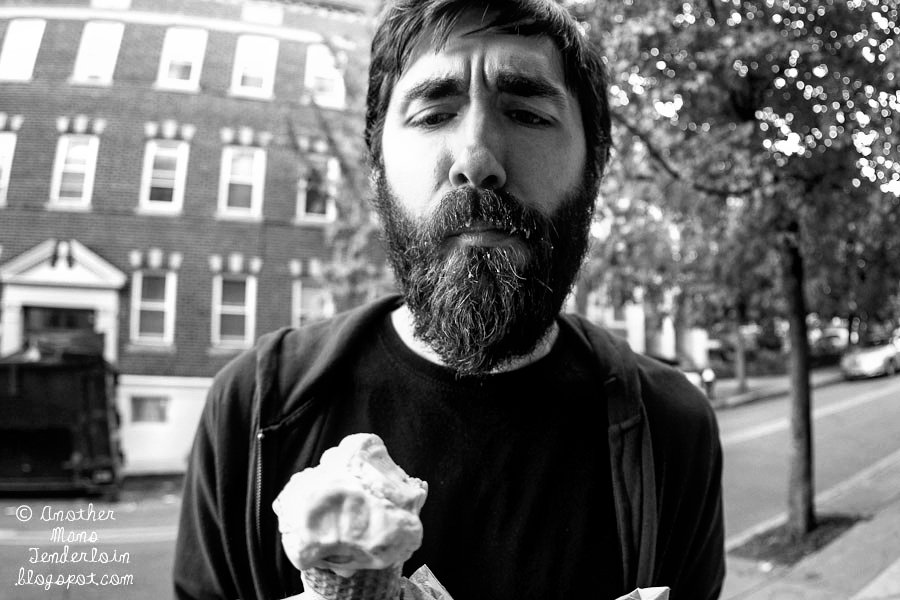
| Some of our fondest memories are from Maine. A spring trip through an icy coast, the lazy atmosphere of small towns where everybody knows everyone, dinners at small restaurants with short menus and passionate chefs, blizzards, pesky albatrosses, lighthouses, hands stiff from the cold warmed by steamy coffee. Back then, we were not in the mood for cities and did not make even a brief stop in Portland. When I found tickets from Boston for a buck each way, I was excited to finally make up for it. The first mug of Portland that I discovered was faces destroyed by drugs and alcohol, the homeless, dirty streets and men propositioning me in a retched way (I'm still puzzled about this one). Then I discovered mug number two - crowds of tourists roaming the beaten commercial paths in the spit-polished part of the city. The third face? I got a glimpse of it once or twice. Maybe a return and further search is in order. Maybe I'm judging Portland too harshly. After all, every American city has its ugly side, dangerous neighborhoods and an artificial side for show. Maybe it's all about the dissonance between the expected and the found. My image was built on our experiences from the coast and on Portland's reputation as a hipster city crazy about its food. |
Z Maine wiążą się jedne z naszych najlepszych wspomnień. Wiosenna podróż oblodzonym wybrzeżem, leniwa atmosfera miasteczek, w których wszyscy się znają, obiady w restauracyjkach z małym menu i wielką pasją, śnieżyce, natrętne albatrosy, latarnie morskie, skostniałe dłonie ogrzewane parującą kawą.
Nie mieliśmy wtedy ochoty na miejskie klimaty i nie zatrzymaliśmy się nawet w Portland. Kiedy znalazłam bilety z Bostonu za dolara w każdą stronę, ucieszyłam się, że w końcu to nadrobię.
Pierwsza gęba Portland, jaką odkryłam, to były twarze zniszczone przez alkohol i narkotyki, bezdomni, brudne ulice oraz mężczyźni w mało wyszukany sposób okazujący swoje zainteresowanie.
Potem odkryłam gębę drugą - tłumy turystów przemierzające udeptane komercyjne ścieżki w ulizanej części miasta.
Trzecie oblicze? Mignęło gdzieś tylko raz czy dwa. Być może powinnam wrócić i kontynuować poszukiwania.
A może oceniam Portland miasto zbyt surowo. W końcu każde większe amerykańskie miasto ma swoją brzydką stronę, niebezpieczne dzielnice i wypolerowaną stronę pokazową. Może to chodzi po prostu o zgrzyt między tym, co oczekiwane, a tym, co zastane. Na moje wyobrażenia składały się nasze doświadczenia z wybrzeża i reputacja Portland jako hipsterskiego miasta zakręconego wokół jedzenia.
|


| My first destination was the Portland Observatory, which looks just like a lighthouse (but it's not), see for yourself on the mural! | Pierwsze kroki skierowałam do Portland Observatory, które wygląda całkiem jak latarnia morska (lecz nią nie jest), zobaczcie na muralu! |


| For a port town, Portland has quite an unfortunate location - ships coming into the harbor become visible at the very last moment. When the town got caught off guard and burned to the ground by the British, the residents grew tired of surprises and in 1807 the observatory was built. Using a telescope, they were able to identify ships from as far as 30 miles away! |
Portland niefortunnie położone jest tak, że wpływające do portu statki widać dopiero w ostatniej chwili. Kiedy miasto zostało zaskoczone i spalone przez Brytyjczyków, mieszkańcom znudziły się niespodzianki i w 1807 r. postawiono obserwatorium. Dzięki teleskopowi identyfikowano statki z odległości niemal 50 km! |

| It's hard to believe, but in the long history of the observatory there haven't been any suicidal jumpers, not a single one! My questions made the guide nervous and he was hesitant to leave me by myself when I said I was staying at the top to take pictures. | Trudno w to uwierzyć, ale w całej historii obserwatorium nie wyskoczył z niego żaden samobójca! Pan przewodnik po moich pytaniach zrobił się nerwowy i ociągał się z zejściem, kiedy powiedziałam, że zostaję na szczycie żeby zrobić zdjęcia. |

to be continued.../c.d.n.











































